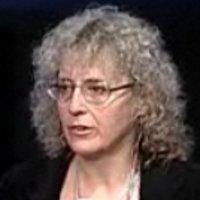Susan notes: I've copied and pasted this biographical information and talk unabashedly from the TED website.
 So the Mars Rovers didn't scoop up any alien lifeforms. Scientist
Penelope Boston thinks there's a good chance -- a 25 to 50 percent
chance, in fact -- that life might exist on Mars, deep inside the
planet's caves. She details how we should look and why.
So the Mars Rovers didn't scoop up any alien lifeforms. Scientist
Penelope Boston thinks there's a good chance -- a 25 to 50 percent
chance, in fact -- that life might exist on Mars, deep inside the
planet's caves. She details how we should look and why.
Penelope Boston is fascinated by caves -- secret, mineral
environments that shelter mysteries in beguiling darkness and
stillness. She's spent most of her career studying caves and karst
formations (karst
is a formation where a bedrock, such as limestone, is eaten away by
water to form underground voids), and is the cofounder of the new National Cave and Karst Research Institute, based in New Mexico.
2009-09-30
Posted in TED Talks (Individual)
Susan notes: I've copied and pasted this biographical information and talk unabashedly from the TED website.
 Nina Jablonski says that differing skin colors are simply our bodies'
adaptation to varied climates and levels of UV exposure. Charles Darwin
disagreed with this theory, but she explains, that's because he did not
have access to NASA.
Nina Jablonski says that differing skin colors are simply our bodies'
adaptation to varied climates and levels of UV exposure. Charles Darwin
disagreed with this theory, but she explains, that's because he did not
have access to NASA.
"Much of what we consider our humanity is imbued in our skin," Nina
Jablonski tells us. This insight came to her in 1981, as she observed a
jittery anatomy class warm to a cadaver only after cutting through its
skin. As it turns out, marvels abound of this sweaty, hardwearing,
social -- and underappreciated -- organ. Many are collected in her
book, Skin: A Natural History, a look at what makes our skin unique
and, perhaps, more important than we realize.
2009-09-29
Posted in TED Talks (Individual)
Susan notes: I've copied and pasted this biographical information and talk unabashedly from the TED website.
 Eva Vertes -- only 19 when she gave this talk -- discusses her journey
toward studying medicine and her drive to understand the roots of
cancer and Alzheimer’s.
Eva Vertes -- only 19 when she gave this talk -- discusses her journey
toward studying medicine and her drive to understand the roots of
cancer and Alzheimer’s.
Vertes may not yet have the answers she needs to cure cancer,
but she's asking some important -- and radical questions: If smoking
can cause lung cancer, and drinking can cause liver cancer, is it
possible that cancer is a direct result of injury? If so, could cancer be caused by the body's own repair system going awry?
2009-09-29
Posted in TED Talks (Individual)
Susan notes: I've copied and pasted this biographical information and talk unabashedly from the TED website.
 Sheila Patek, a UC Berkeley biologist, made a name for herself by
measuring the hyperfast movements of snail-smashing mantis shrimp heels
and bug-snapping ant jaws, using high-speed video cameras recording at
up to 20,000 frames per second. In 2004, she and her team showed that
peacock mantis shrimp had the fastest feeding strike in the animal
kingdom, and that they are the only known animal to store energy in a hyperbolic paraboloid, a super-strong Pringles-shaped structure more often found in modern architecture.
Sheila Patek, a UC Berkeley biologist, made a name for herself by
measuring the hyperfast movements of snail-smashing mantis shrimp heels
and bug-snapping ant jaws, using high-speed video cameras recording at
up to 20,000 frames per second. In 2004, she and her team showed that
peacock mantis shrimp had the fastest feeding strike in the animal
kingdom, and that they are the only known animal to store energy in a hyperbolic paraboloid, a super-strong Pringles-shaped structure more often found in modern architecture.
2009-09-29
Posted in TED Talks (Individual)
Susan notes: I've copied and pasted this biographical information and talk unabashedly from the TED website.
 Novelist Amy Tan digs deep into the creative process, looking for hints of how hers evolved.
Novelist Amy Tan digs deep into the creative process, looking for hints of how hers evolved.
Born in the US to immigrant parents from China, Amy Tan rejected her mother's expectations that she become a doctor and concert pianist. She chose to write fiction instead. Her much-loved, best-selling novels have been translated into 35 languages. She's writing a new novel and creating the libretto for The Bonesetter's Daughter, which will have its world premiere in September 2008 with the San Francisco Opera.
2009-09-29
Posted in TED Talks (Individual)
 So the Mars Rovers didn't scoop up any alien lifeforms. Scientist
Penelope Boston thinks there's a good chance -- a 25 to 50 percent
chance, in fact -- that life might exist on Mars, deep inside the
planet's caves. She details how we should look and why.
So the Mars Rovers didn't scoop up any alien lifeforms. Scientist
Penelope Boston thinks there's a good chance -- a 25 to 50 percent
chance, in fact -- that life might exist on Mars, deep inside the
planet's caves. She details how we should look and why.
 Nina Jablonski says that differing skin colors are simply our bodies'
adaptation to varied climates and levels of UV exposure. Charles Darwin
disagreed with this theory, but she explains, that's because he did not
have access to NASA.
Nina Jablonski says that differing skin colors are simply our bodies'
adaptation to varied climates and levels of UV exposure. Charles Darwin
disagreed with this theory, but she explains, that's because he did not
have access to NASA.
 Eva Vertes -- only 19 when she gave this talk -- discusses her journey
toward studying medicine and her drive to understand the roots of
cancer and Alzheimer’s.
Eva Vertes -- only 19 when she gave this talk -- discusses her journey
toward studying medicine and her drive to understand the roots of
cancer and Alzheimer’s.
 Sheila Patek, a UC Berkeley biologist, made a name for herself by
measuring the hyperfast movements of snail-smashing mantis shrimp heels
and bug-snapping ant jaws, using high-speed video cameras recording at
up to 20,000 frames per second. In 2004, she and her team showed that
peacock mantis shrimp had the fastest feeding strike in the animal
kingdom, and that they are the only known animal to store energy in a hyperbolic paraboloid, a super-strong Pringles-shaped structure more often found in modern architecture.
Sheila Patek, a UC Berkeley biologist, made a name for herself by
measuring the hyperfast movements of snail-smashing mantis shrimp heels
and bug-snapping ant jaws, using high-speed video cameras recording at
up to 20,000 frames per second. In 2004, she and her team showed that
peacock mantis shrimp had the fastest feeding strike in the animal
kingdom, and that they are the only known animal to store energy in a hyperbolic paraboloid, a super-strong Pringles-shaped structure more often found in modern architecture.
 Novelist Amy Tan digs deep into the creative process, looking for hints of how hers evolved.
Novelist Amy Tan digs deep into the creative process, looking for hints of how hers evolved.